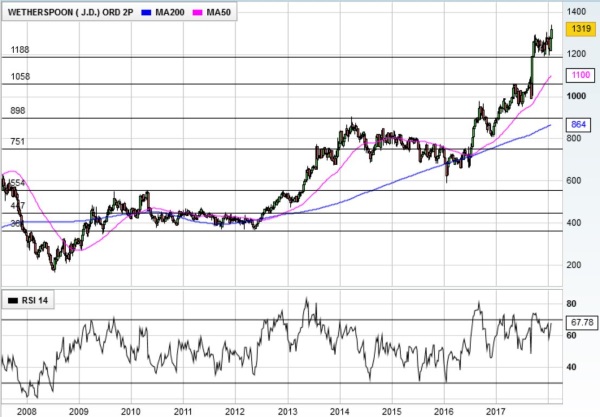JD Wetherspoon: Cheap beer, pricey shares
24th January 2018 14:24
by Graeme Evans from interactive investor
Share on
Tuesday night is usually steak night at 's 900-plus pubs. Except last night there was no steak. Punters were unhappy, triggering a torrent of negative headlines after Wetherspoon admitted to a supplier issue.
But the chances are that the missing Aberdeen Angus rump steaks won't have any lasting impact on customer loyalty or sales. Wetherspoon has a seemingly unique place within the hospitality sector, with its trusted recipe of low-price food and drink menus a consistently winning formula across many high streets.
This was demonstrated again today as chairman Tim Martin revealed better-than-expected Christmas trading, with a 6% increase in like-for-like sales for the first 12 weeks of the second quarter to January 21.
As a result, year-to-date profit is running slightly ahead of expectations, although he admits that a similar outperformance in the second half of the year will be harder to achieve due to labour costs, business rates and the sugar tax.
Even though Wetherspoon is perceived as the bargain option for drinkers, its shares are still very much at the expensive end of the food and drink sector.
The valuation has been looking frothy for a while, but it's clearly a price that investors are willing to pay, with shares up by as much as 3% to a new record of 1,309p today. A forward price/earnings (PE) multiple of 18 currently compares with its 10-year average, according to data site Sharepad, of 14.7.

This progress comes despite the sector being squeezed by the costs highlighted by Martin and the impact of the consumer spending slowdown.
Peel Hunt has a target price of 1,100p and thinks today's update demonstrates that the company is "running hard to stand still".
They note a material premium in the share price to the company's freehold peer group, adding that on current forecasts Wetherspoon offers no higher growth and a much lower dividend yield (0.9%).
The broker still increased its full-year profit forecast by 2% to £101.2 million, assuming that annual like-for-like sales rise by 4.5% and underlying earnings are flat.
They added: "The need to grow LFL sales at a higher rate to offset rising costs reflects an emphasis on volume rather than price-driven LFL sales growth."
This article is for information and discussion purposes only and does not form a recommendation to invest or otherwise. The value of an investment may fall. The investments referred to in this article may not be suitable for all investors, and if in doubt, an investor should seek advice from a qualified investment adviser.